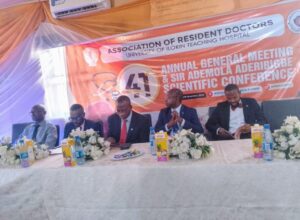

By correspondent in Ilorin.

Prof. Kolawole Wahab, a Consultant Neurologist at the University of Ilorin Teaching Hospital (UITH), has raised concerns about the growing trend of medical graduates “japa-ing”—leaving Nigeria—without completing their mandatory housemanship. Wahab shared his concerns during a lecture at the Annual General Meeting and Scientific Conference of the Association of Resident Doctors, UITH (ARD-UITH) in Ilorin.
Delivering a lecture titled “Reshaping Residency Training in Nigeria: Digital Technology, Financial Inclusion, and Their Impact on Residency Training,” Wahab underscored the critical role of residency training in fostering self-directed learning and skill development.
He urged medical graduates to see the housemanship as a vital phase for their professional growth, emphasizing that programmes accredited by the National Postgraduate Medical College of Nigeria or the West African Postgraduate Medical College are essential pathways to expertise.
“There is a need to keep pace with societal changes, especially in acquiring the necessary skills for modern healthcare,” Wahab said.
He also nite the transformative role of digital technology in residency training,and encouraged medical doctors to explore fields like Artificial Intelligence (AI) and Telemedicine.
The consultant described Telemedicine as a crucial tool for delivering remote clinical care, particularly in the era of rapid technological advancement.
On financial inclusion, Wahab stressed its importance in achieving Sustainable Development Goal 17, which focuses on health and well-being, noting that equitable access to financial resources enhances healthcare delivery.
In a related lecture, Prof. Gordon Kayode, a Consultant Public Health Physician at UITH, discussed the impact of climate change on global health.
His presentation, titled “The Effect of Climate Change on Emerging and Re-emerging Diseases: Bridging Reality and Research for Holistic Healthcare,” detailed how climate change accelerates the spread of emerging viral diseases, many of which have no antiviral treatments.
He urged collaborative efforts to combat climate change through renewable energy adoption, reduced carbon footprints, and eco-friendly practices.
Earlier, ARD-UITH President Dr. Muhammed Yusuf, described the event’s theme as reflective of the current challenges in residency training.
He noted that the AGM featured medical outreaches, donations to orphanages, and elections for new executives.
The alarming trend of young doctors “japa-ing” before completing housemanship underscores the urgent need for reforms in Nigeria’s medical training system, as well as broader efforts to address the economic and professional factors driving this exodus.
Edited by Dada Ahmed.


